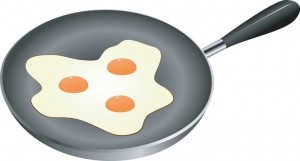 Do you love eggs, but are afraid to eat them? If you do, is it only ghostly looking egg whites that are allowed to make an appearance on your plate?
Do you love eggs, but are afraid to eat them? If you do, is it only ghostly looking egg whites that are allowed to make an appearance on your plate?
Is It The Cholesterol In Eggs That’s Freaking You Out?
We all have cholesterol in our bodies. It’s used to form cell membranes, some hormones, and for other functions.
You get cholesterol in two ways. Your body — mainly your liver — usually makes about 1,000 milligrams a day. You also get it from eating foods that contain cholesterol. Animal foods — especially egg yolks, meat, poultry, shellfish, and whole and reduced fat dairy products — contain it. Plant foods don’t.
Your body can usually make all the cholesterol it needs so it’s not necessary to eat it. Still, the average American man consumes about 337 milligrams of cholesterol daily; the average woman, 217 milligrams. The American Heart Association recommends limiting your average daily cholesterol intake to less than 300 milligrams; less than 200 milligrams if you have heart disease.
Eggs Used To Be Cholesterol No-Nos
We used to be told not to eat eggs, certainly not the yolks, because of what they would do to our cholesterol levels. Egg yolks do contain a lot of cholesterol and may have a weak effect on blood cholesterol levels, but they also contain nutrients like protein, vitamins B12 and D, riboflavin, and folate that might help to lower the risk for heart disease.
There is solid research that shows that for most people the cholesterol in food has a much smaller effect on the total cholesterol and harmful LDL cholesterol in the blood than the mix of fats in the diet does.
Recent research shows that eating moderate numbers of eggs — up to one a day—doesn’t increase the risk of heart disease risk in healthy people and can be part of a healthy diet. It’s recommended that people with diabetes and heart disease limit eggs to no more than three yolks a week.
Can You Eat Eggs Every Day?
The research isn’t suggesting three-egg omelettes as daily fare — especially if they’re loaded with cheese, bacon, and sausage. Your body handles scrambled eggs, salsa, and a whole wheat English muffin a lot differently than scrambled eggs with cheese, sausage or bacon, home fries, and white toast with butter. You might consider choosing eggs with high omega-3 content from free range organically raised chickens and steering clear of adding saturated fat (most notably, butter) when they’re cooked. If you have a three egg omelette one day, skip eggs for the next day or so.
Egg Nutrition
1 large egg: 71 calories, 5g total fat (2g saturated), 211mg cholesterol, 70mg sodium, 0g carbohydrate, 6g protein
1 (large) egg yolk: 54 calories, 5g total fat (2g saturated), 210mg cholesterol, 8mg sodium, 1g carbohydrate, 3g protein
1 (large) egg white: 16 calories, 0g fat, 0g cholesterol, 55mg sodium, 0g carbohydrate, 4g protein


